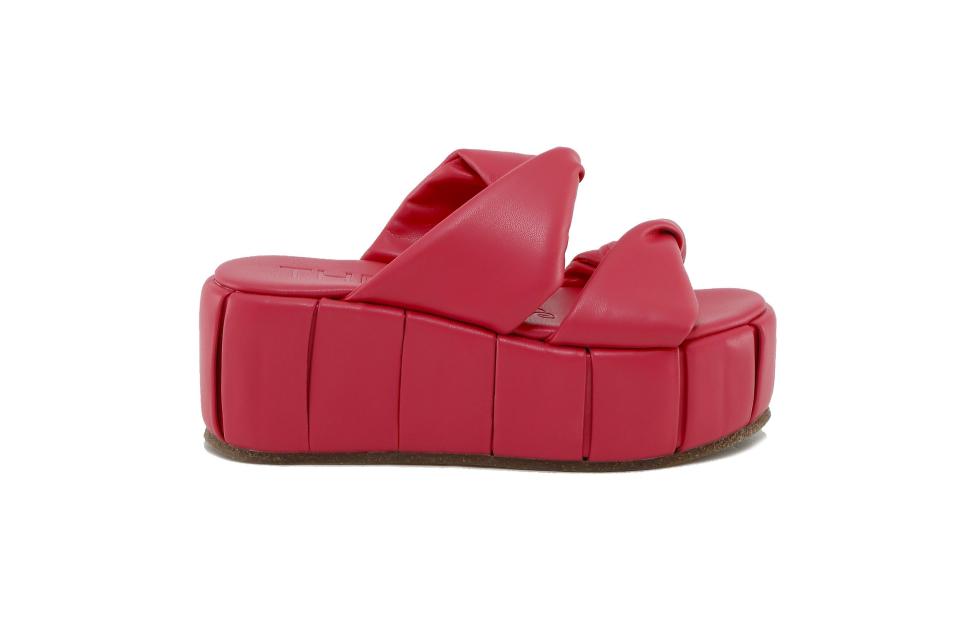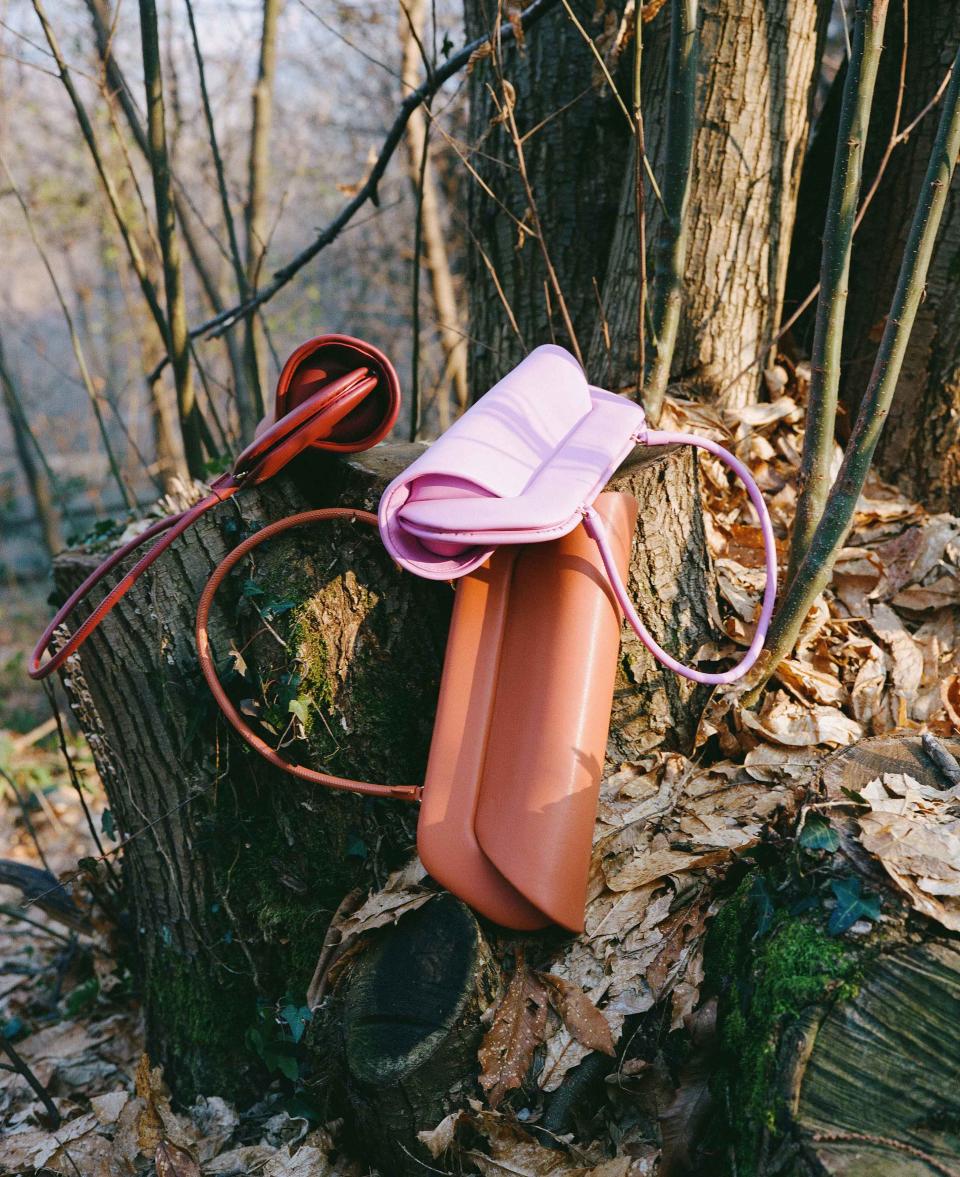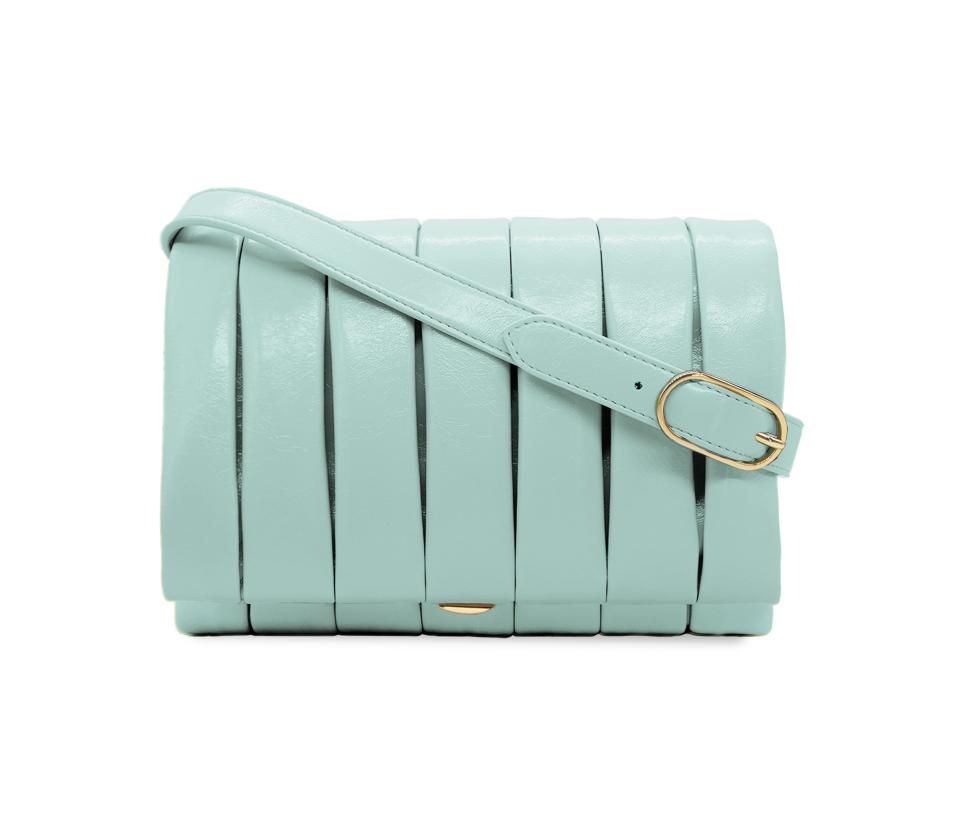Sustainable Fashion Awards Finalist Themoirè Debuts Footwear at Milan Fashion Week

MILAN — Francesca Monaco and Salar Bicheranloo found out they were among the finalists of the Italian fashion chamber’s Sustainable Fashion Awards almost by chance, from a press report, on a sunny morning in July.
The founders of Themoirè — a Milanese accessories brand that aims to have the lowest possible environmental impact — are in the running for The Bicester Collection Award for Emerging Designers, one of the 12 prizes that will be handed out at La Scala theater here in a ceremony hosted by Rossy de Palma on Sunday.
More from WWD
In the category, the duo will compete with sustainable brand Nkwo and the fashion house Torlowei — both hailing from Nigeria — for a chance to win a mentorship, and production and distribution opportunities.
“The fact that finalists could be picked across all categories and not just accessories makes me even prouder,” said Monaco.
Yet the whole award buzz plays only a small role in marking a special edition of Milan Fashion Week for the brand. This season the founders will expand their offering of eco-friendly handbags to debut their first footwear range via a capsule collection to be unveiled at Themoirè’s spring 2023 presentation, to be held Wednesday at the city’s Galleria Riviera.
Although it’s not the first time the brand has done a capsule collection — in the past it has done them for categories such as trench coats and jewelry — Monaco said Themoirè shoes are here to stay.
The first footwear drop will include three styles, each coming in two variants, ranging from platform mules in polyurethane leather and recycled cork to options in straw.

The range will mirror the founders’ approach to bags, for which they work with natural, recycled or alternative materials for all aspects of the product, spanning from lining and threads to labels and packaging.
“But it’s way more difficult to do footwear: There are many different components, you need the right partner and suppliers require minimum orders that are very high,” noted Monaco, who said the couple has been working on the project for a year. She also stressed the importance of maintaining the brand’s approachable positioning, revealing that prices for footwear will range from around 250 euros to 550 euros.
Looking to balance all of these aspects, the duo couldn’t find the right partner in Italy, but relied on a manufacturer in Greece for footwear. “We’re sad about this because we would have liked to keep everything in Italy, but we just couldn’t find the right value for money here,” said Monaco.

“The truth is that it is very easy to do an expensive product, but to combine quality, an eco-conscious approach, design and a good price is a whole different story,” echoed Bicheranloo.
A Mexican designer with 15 years experience in handbag design, Bicheranloo founded his first brand, Salar, in 2009. More trend-oriented and still operating, the Salar label “follows another path, with four collections presented per year.”
“But in 2019 we asked ourselves, ‘Why are we doing this?’ and questioned the pace of this industry,” recalled Monaco. “We wanted to commit to a project that was responsible for the planet and communities, not defined as sustainable because that’s impossible. We didn’t want to impose these notions to the brand we had because it would have seemed more like a marketing move, so we opted for a side project,” said Monaco.
Themoirè’s first collection instantly garnered the attention of buyers, who confirmed orders even if the first delivery coincided with the COVID-19 outbreak in February 2020. “You could already feel there was a change from retailers and consumers,” noted Monaco, referring to the increasing interest in eco-friendly brands.
While Monaco and Bicheranloo focus on timeless designs, opting for vintage-tinged clutches and geometrical tote bags that could live longer in customers’ closets, they constantly scout new materials, which makes for the most challenging part of their job.

So far, Themoirè uses four main categories of materials: natural ones, such as cork, cotton, raffia, wood and straw; recycled options like nylon threads, postconsumer denim and eco-fur; waterborne polyurethane leather, and innovative alternatives, including fabrics derived from Nopal cactus, pineapple leaves, apple waste and orange peels, to name a few.
“There’s so much experimentation from suppliers, they are really trying to do new stuff but sometimes these are just not ready for the market,” said Monaco. “Plus, not everything can work and match our needs. Many options are fitting for clothing, others for automotive,” she added, citing the fabric derived from apple waste as inadequate when developing footwear, for example.
“The research is the toughest part, also because it’s a circle. The more we use these alternatives, the more money suppliers have to invest and fine-tune them,” echoed Bicheranloo. “But it all depends on the consumers, too. For one, there’s a mushroom-based material that’s great, but it costs more than leather. I can make a bag with that, but will people eventually understand its price?”
Another challenge is balancing what is available with their creative drive. “Usually these materials come in a limited range of colors, so developing a different collection is not an easy task, too,” confirmed Monaco.

Still, the sleek aesthetic and brand communication contributed to enhance the perception of the product. Although the average price tag for a bag is around 270 euros, Themoirè is available at 230 points of sales worldwide in the high-end positioning, including Rinascente and LuisaViaRoma in Italy, and the likes of Saks Fifth Avenue, Neiman Marcus and Bergdorf Goodman in the U.S., where the brand launched last year.
Italy is still the prime market, followed by the rest of Europe and the U.S. The Middle East is catching up thanks to key wholesalers putting big orders in Dubai, while Monaco was particularly impressed by the brand’s performance in Greece.
In 2021 the brand totaled 2 million euros in revenues, doubling the sales generated the previous year.

“A stand-alone store can wait,” said Bicheranloo when asked about future distribution plans. “We work with a limited stock and having a store would imply developing also a strategy to compensate what we do from an environmental point of view.…It would be in Milan, but it would represent more of a communication tool, rather than key for sales. But if that’s its purpose, it’s too big of an investment, we prefer to communicate the brand in another way,” he said.
The couple’s alternative approach includes social initiatives. For one, during Milan Fashion Week, the company will unveil the second chapter of Together by Themoirè, a series of projects intended to create dialogue among communities of artisans and the brand as well as spotlight minorities in need.
After tying up with a Mexican community in Oxchuc, Chiapas, the founders headed to Madagascar for the second iteration of the project. Here they cocreated raffia bags with local artisans, honoring their traditional techniques and shooting a dedicated campaign on-site to raise awareness around their personal stories. Part of the proceeds from sales of the capsule collection will be donated to a local charity project.

In general, Themoirè donates a percentage of its profit to organizations that are also committed to climate change and plants a tree for each bag sold in a partnership with TreeNation.

